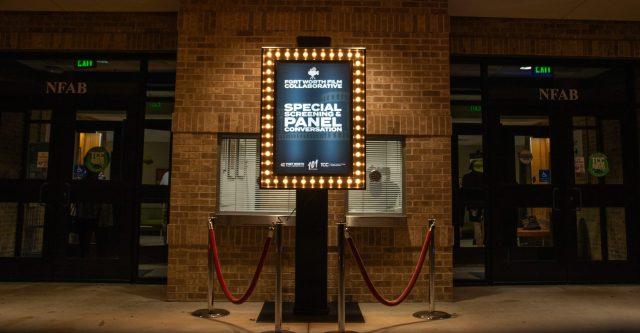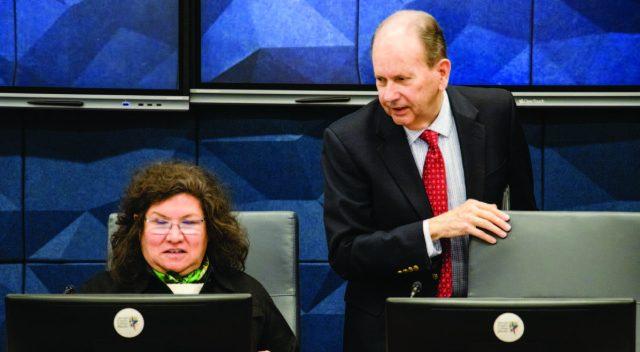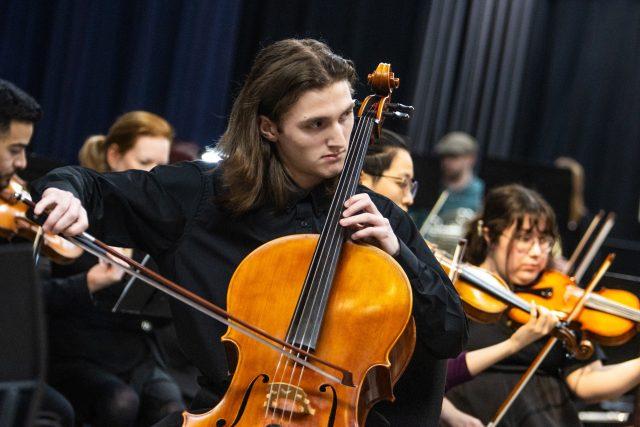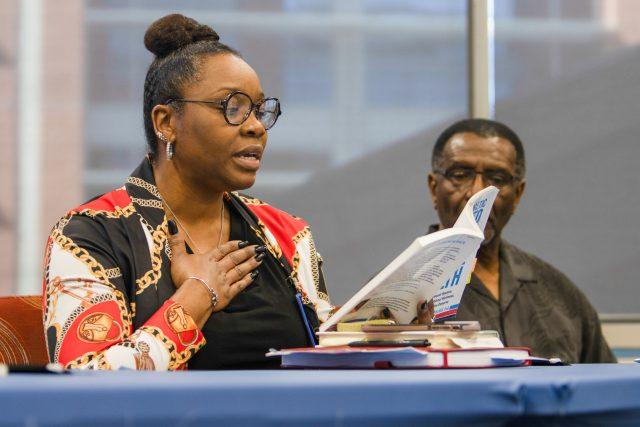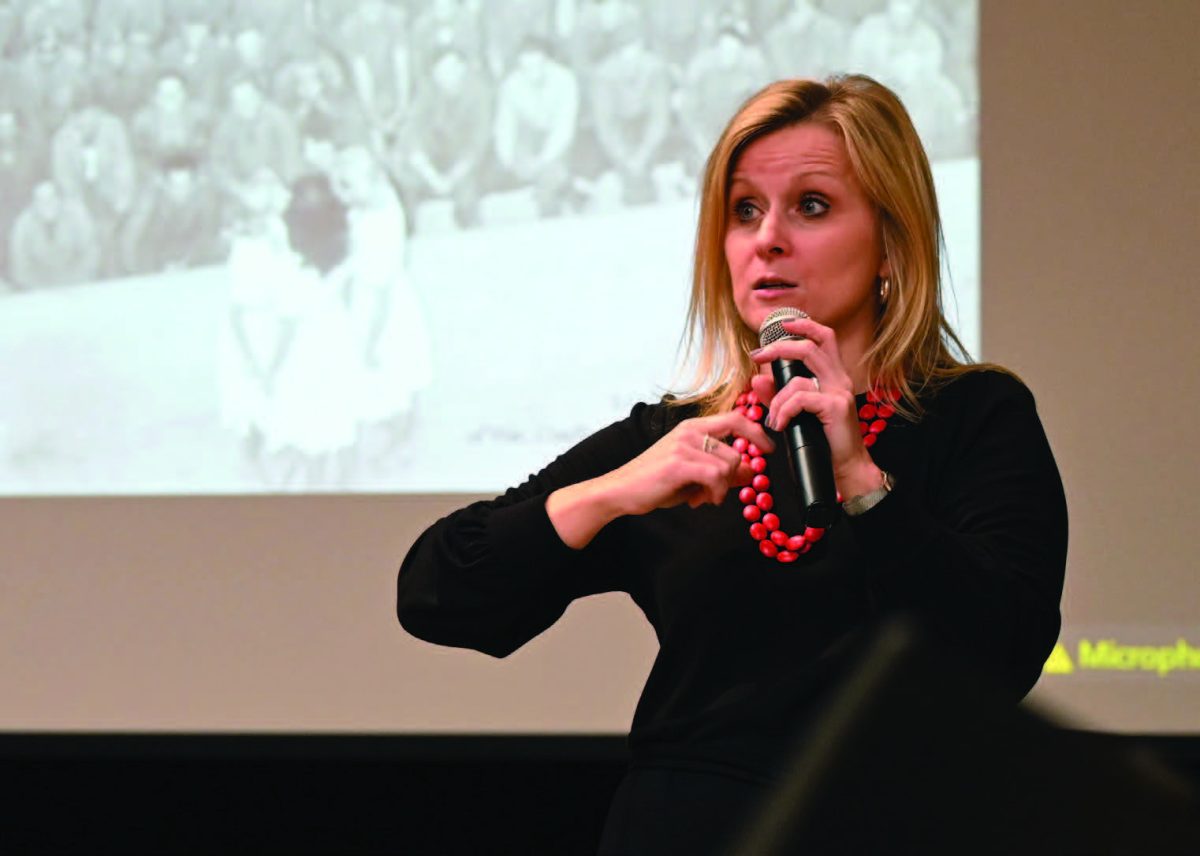XAVIER BOATNER &
FOUSIA ABDULLAHI
campus editors
collegian.editor@tccd.edu
The Fort Worth Film Collaborative rolled out the red carpet for the event that introduced a new fast-tracked program. The event also featured meet-and-greet tables with production companies.
These companies included 101 Studios, MPS Studios, Panavision, Red Productions, Backlot Studios, Lowtown Studios and the Lone Star Film Society.
TCC student Hannah Bohnert found out about the event on Instagram and decided to come out to network.
“I have a background in technical theater, so I’m trying to break into the production side of film.” she said. I want to write and direct someday. But I’m really interested in getting to know how all of it works. There’re so many parts of it.”
Former RTVB student Daniel Vera works at Lowtown Studios as a marketing intern and wished the new certification program was available when he was a student.
“It’s really exciting to see all these people come together, not only film production companies, studios, rental places, the Film Commission itself,” he said. “I just see the industry booming, and I’m just beyond stoked to be able to see it happening.”
Students are seeking different ways to connect with other creators on campus and in the production industry.
“I feel like we’re all looking for somebody to work with,” said NE student Bethany Anthony. “We all need to be a team in order to make any of our dreams a reality.”
As the scope of the film industry grows, so does the number of doors that have begun opening for aspiring film students.
David Glasser from 101 Studios spoke about the program and why it is crucial in helping studios find more state-trained workers so shows can continue to be made in North Texas.
“We need more jobs,” Glasser said. “Anybody here right now who’s looking for a job in the film community in Texas, right now at this moment in time, we need those jobs in whatever division you want, whatever you want to pursue.”
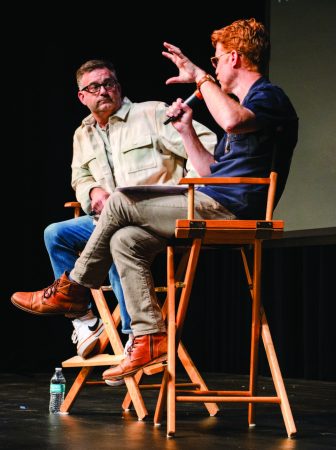
101 Studios production executive John Hermansen and president and producer of
Red Productions Red Sanders speak about the film collaborative during panel.
There are many fields that need to be filled, and the Fort Worth Film Collaborative has pinpointed them as immediate needs for production companies.
“Pretty much everywhere, there’s a need,” Instructor Sean Fousheé said, “Initially, we identified three areas, grip, gaff, hair and makeup, as well as light set construction.”
The film collaborative spotlighted the growing film scene in Tarrant County and served as a means of showcasing TCC’s plans to expand the number of opportunities for students to step into industry in an educated and professional capacity.
To top off the event was a special, free screening of Paramount Plus popular series “Lawmen: Bass Reeves.”
The event has been in the works for many months and special event coordinators have given some insight into the thought process behind the partnership.
“The program began over the summer of 2023,” NE instructor Sean Fousheé said. “Following the 88th Texas Legislature’s passage of a $200 million incentive for in-state film productions, both organizations [TCC and Fort Worth Film Commission] set out to work on plans designed to train individuals for the high-demand jobs.”
This desire to get trained filmmakers from college into the industry came to a head in the form of special courses, he said.
“During the summer of 2023, faculty and administrators at TCC began work on creating micro-credential certificates to fast-track instruction and Jessica Christopherson at the Film Commission reached out to TCC to inquire about creating classes for the film industry,” Fousheé said.
NE coordinator of administrative events Charlotte Stripling said the film scene in Texas has grown in recent years, and similarly, the demand for workers in the industry has grown as well.
“The college puts the students together with the Film Commission program, they graduate, and then they come out and work in the film industry,” she said. “That’s why we have industry partners. That’s the way it’s supposed to work.”
With the success of the collaboration, Stripling explained some of her goals for TCC moving forward, including ramping up promotion for on-campus activities, and trying to keep both the public and the students in the loop by educating them about the numerous opportunities all around them.
“We have all these little brown buildings and until you walk inside and talk to people and really engage, you don’t realize the opportunity here,” she said.
As of now, the program has around 30 students enrolled in classes across NE, South and Connect Campus. Currently, both 101 Studios and Red Productions have placed students on active film sets such as Angel Studios’ “The Chosen,” according to Fousheé.
“The support we’ve received from the industry has been amazing and everyone involved is excited to get TCC students placed on sets around the state,” he said.
One of the key components of this new fast-track approach is the asynchronous and flexible nature, allowing students to select from a variety of bite-sized courses catered to different skillsets, NE president assistant Terri Ford said.
“It’s all still part of the film industry. You want to do the construction or the design of the costume? Then you can take those [courses],” she said. “So, it’s very agile.”
However, that agility isn’t exclusive to just students, as it can also be beneficial to industry partners, Ford said.
“Our goal has been to be a beacon for the creative class here,”
– Red Productions CEO Red Sanders
“So, let’s say we got a movie that’s coming in and is heavily related to having a lot of makeup and a lot of hair pieces,” she said. “So, then we could really say, ‘Okay, we’re going to start this certificate. We know that this filming is going to come in the latter part of the year or whenever – then we can push that out.’”
The underlying intent behind the collaboration between the various studios and TCC, according to Red Productions CEO Red Sanders, is to build a brand-new environment for upcoming students.
“Our goal has been to be a beacon for the creative class here,” Sanders said. “That really means, like, this is a central point for the industry to come together as a community.”
Sanders hopes students who give the course a go will be able to understand not just more about the filmmaking process but more about the growth of the industry within Texas, as well as recognize and seize the new opportunities arising across the state.
“The main thing I hope people learn is that, like, you can very much live and work here in the film, TV and commercial industry,” he said. “There are thousands of jobs here in the industry, and with the growth we’re seeing in it and with unemployment still at historic lows – if you go through a training program like this, you have a much higher degree of getting placed in one of these jobs coming out of it.”
The commission has expanded over the years, seeing more than 20,000 new jobs openings begin to crop up in its wake, alongside garnering a reputation around the state as it continues to gain traction, Film Commission vice president Jessica Christopherson said.
“So, you know, we are a well-regarded Film Commission in Texas, and we’ve tried to be innovative,” she said. “In what ways can we be innovative? Customer service is one of our main priorities when we have production here in the city. We obviously have more work to do and more room to grow, and that’s part of our collaboration with TCC.”
The underlying intent behind the collaboration between the various studios and TCC, according to Red Productions CEO Red Sanders, is to build a brand-new environment for upcoming students.
“Our goal has been to be a beacon for the creative class here,” Sanders said. “That really means, like, this is a central point for the industry to come together as a community.”


















